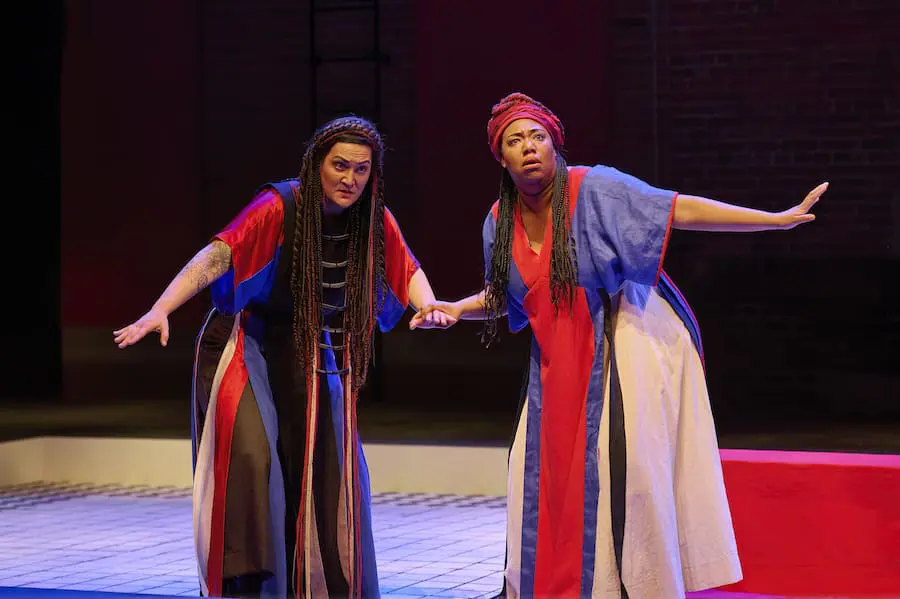On paper, the Canadian Opera Company’s Pomegranate, the opera about lesbian love and loss was intriguing and appealing; it had its world premiere on June 2 at the COC Theatre on Front Street. A plot line that shifts between ancient Pompeii as Vesuvius erupts and a lesbian bar in 1981 in the explosive aftermath of the Toronto Police bathhouse raids; casting that featured a nice lineup of younger artists, some making COC main stage debuts, backed by a chamber-sized COC Orchestra conducted by Rosemary Thomson; and a creative team, led by director Jennifer Tarver, that has a fine record of work on independent theatre projects around the city. The opera, by librettist Amanda Hale and composer Kye Marshall, has been more than a decade in the making. It started with a set of poems Hale published in 2007, then evolved when Marshall set some of these to music in a song cycle performed in 2014, and then again as a chamber opera presented by Toronto’s Buddies in Bad Times Theatre in 2019. In its new two-act, two-hour form, Pomegranate is the first full-scale new work mounted by the COC since Rufus Wainwright’s Hadrian in 2018. But despite all the promise, Pomegranate proved disappointing in performance, its musical and dramatic impact muted by the fact that so much of the singing was incomprehensible. You could follow the broad outline of the plot, but when it came to the finer details and the interactions between the characters, it was too often like listening to a melodic blur of words. I hasten to add that the problem did not lie with the diction or performances of the singers; you could see the commitment and involvement on their faces and in their body language, and there were clearly some fine voices in play. Nor was the problem with the musical setting. The orchestra, in fact, fared better than the voices, its music is colourful and lyrical, there was some lovely playing in short solo passages for violin and cello, and the melding of styles in Marshall’s score—from classical to jazz and blues—is effective and well-wrought. But this is opera, and the music is supposed to make an impact with text. For the audience anyway, Hale’s words were largely missing in action.
The problem was the venue. While Hadrian was mounted in the COC’s Four Seasons Centre, Pomegranate was in the COC Theatre, a large, acoustically difficult space at the company’s headquarters used mainly for events and rehearsals. Many chamber operas have been mounted in the space successfully over the years, but more intimately with smaller audiences. For bigger audiences and larger pieces, especially sung in English and, in this case, with predominantly high female voices, you need surtitles. These, I’m sure, would have presented Pomegranate to considerably better advantage.
The double story line follows parallel lesbian affairs that blossom despite difficult circumstances, that ultimately fall apart. In Pompeii, there’s the free-spirited Cassia pursued by the more intense Suli; in Toronto, it’s the more hesitant Suzie pursued by the lovesick Cass. In Pompeii, the setting is the temple room of a kind of female cult (“brides of Dionysus, daughters of Isis”) presided over by a rather forbidding Priestess; in Toronto, the setting is the Fly By Night lesbian bar run by the pushy but rather jaded Jules. In Pompeii, there’s a marauding Roman legion officer, Marcus, who wants to marry Cassia and is under orders to destroy the cult. In Toronto, there’s an overbearing, homophobic Uncle Salvatore on a rampage to separate Suzie and Cass. Pomegranate essentially presents two versions of the same story, Marshall using mainly strings and woodwinds in a classical style in Act I in Pompeii, and then adding more muted brass and percussion for the jazz-and-blues inflected style of Act II in Toronto. Without benefit of much of the associated text, though, the musical styles are so different that Pomegranate came across more as two successive variations on a theme tacked together than as a single, integrated piece in two acts.
Double-role casting, however, does provide some continuity. As the lovers, soprano Danielle Buonaiuto (Cassia/Cass) and mezzo Adanya Dunn (Suli/Suzie) sounded well together and seemed to be fully invested in their roles. Mezzo Catherine Daniel brought a rich mezzo to her turn as Livia in Pompeii and was moving as Suzie’s mother, almost in grieving at the prospect of “losing” her child to Cass. Soprano Teiya Kasahara as the cult Priestess and the Fly By Night bar owner, Jules, proved particularly adept in every genre of Marshall’s music. The single male voice in the production, baritone Peter Barrett, as Marcus the legionnaire and Suzie’s Uncle Salvatore, brought some welcome contrast to the high-flying vocal soundscape of the piece, though neither of his characters are sympathetic. He was key, though, to one of its most effective scenes, in Act II, when he and Suzie’s mother confront Suzie and Cass in the bar and force the young girl to make a choice between her family and her lover. The scene seemed to be Pomegranate at it most personal and most intense, dramatically and musically, but even here the interplay of voices and what was being sung was far from clear.
Pomegranate is a co-production with Vancouver Opera, where it scheduled for a remount in 2024.
Related Content ⬇
Opera Canada depends on the generous contributions of its supporters to bring readers outstanding, in-depth coverage of opera in Canada and beyond. Please consider subscribing or donating today.
CANADIAN OPERA COMPANY
JUNE 2 TO 4
MARSHALL/HALE POMEGRANATE
Conductor Rosemary Thomson
Director Jennifer Tarver
Composer Kye Marshall
Librettist Amanda Hale
Assistant Conductor Jennifer Tung
Assistant Director Marie-Josée Chartier
Set Designer Lorenzo Savoini
Costume Designer Andjelija Djuric
Lighting Designer Kimberly Purtell
Movement Coordinator Marie-Josée Chartier
Fight Director Matt Richardson
Price Family Chorus Master Sandra Horst
Stage Manager Lesley Abarquez
Suli/Suzie Adanya Dunn
Cassia/Cass Danielle Buonaiuto
Livia/Suzie’s Mother Catherine Daniel
Marcus/Uncle Salvatore Peter Barrett
Priestess/Jules Teiya Kasahara 笠原貞野
With the COC Orchestra and Chorus
Co-production with Vancouver Opera















